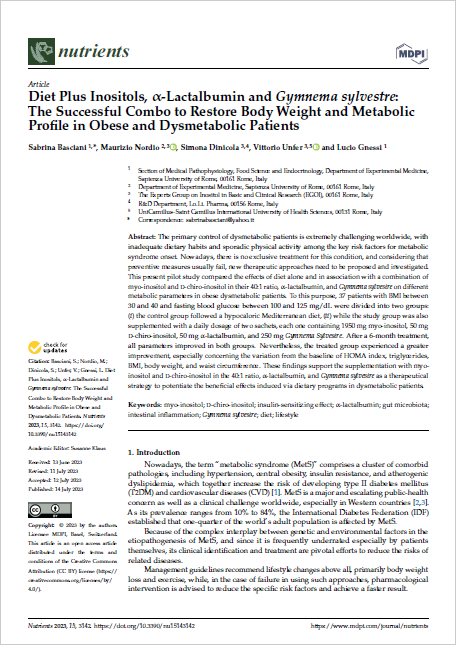Authors:
Sabrina Basciani, Maurizio Nordio, Simona Dinicola, Vittorio Unfer and Lucio Gnessi
The primary control of dysmetabolic patients is extremely challenging worldwide, with
inadequate dietary habits and sporadic physical activity among the key risk factors for metabolic
syndrome onset. Nowadays, there is no exclusive treatment for this condition, and considering that
preventive measures usually fail, new therapeutic approaches need to be proposed and investigated.
This present pilot study compared the effects of diet alone and in association with a combination of
myo-inositol and D-chiro-inositol in their 40:1 ratio,
-lactalbumin, and Gymnema sylvestre on different
metabolic parameters in obese dysmetabolic patients. To this purpose, 37 patients with BMI between
30 and 40 and fasting blood glucose between 100 and 125 mg/dL were divided into two groups:
(i) the control group followed a hypocaloric Mediterranean diet, (ii) while the study group was also
supplemented with a daily dosage of two sachets, each one containing 1950 mg myo-inositol, 50 mg
D-chiro-inositol, 50 mg
-lactalbumin, and 250 mg Gymnema Sylvestre. After a 6-month treatment,
all parameters improved in both groups. Nevertheless, the treated group experienced a greater
improvement, especially concerning the variation from the baseline of HOMA index, triglycerides,
BMI, body weight, and waist circumference. These findings support the supplementation with myoinositol
and D-chiro-inositol in the 40:1 ratio,
-lactalbumin, and Gymnema sylvestre as a therapeutical
strategy to potentiate the beneficial effects induced via dietary programs in dysmetabolic patients.

